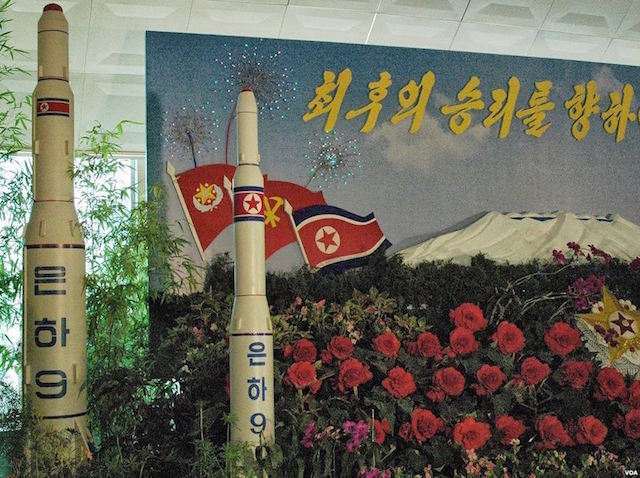By Rodney Reynolds | IDN-InDepthNews Analysis
UNITED NATIONS (IDN) – When the 15-member UN Security Council (UNSC) met at an emergency session on February 7, a non-working Sunday afternoon, to discuss the most recent defiance by the Democratic People’s Republic of Korea (DPRK), the outcome was predictable.
After “urgent consultations”, the UNSC “strongly condemned” DPRK for launching a rocket which could lead to the future development of intercontinental ballistic missile technologies.
But the Council stopped short of penalizing a country that continues to defy the world body despite several previous resolutions – and a rash of U.S. economic sanctions.
The UNSC met less than 48 hours after the rocket launch which the United States described as a “major provocation, threatening not only the security of the Korean peninsula, but also of the region and the United States as well”.
Since any move to impose additional sanctions on DPRK would have triggered a veto from one of its closest allies, China, the U.S. opted for condemnation rather than punitive action.
Tariq Rauf, Director of the Disarmament, Arms Control and Non-Proliferation Programme at the Stockholm International Peace Research Institute (SIPRI), told IDN that China has continued to nurture DPRK after the breakup of the USSR.
Currently, DPRK is the only other state with old school official Communist/Socialist party in charge – and a collapse of DPRK would portent badly for China, he added.
And more importantly, he pointed out, China does not want to take on the burden of a collapsed DPRK – even as DPRK’s actions continue to upset Japan, South Korea and the U.S.
The situation is more complicated, he said, because the declining influence of China over current DPRK leaders is also a greater loss of face for China.
Despite a politically mild statement, the UNSC reserved the right to take more drastic measures at a later date.
The members of the Security Council restated their intent to “develop significant measures” in a new Security Council resolution in response to the fourth nuclear test conducted by the DPRK on January 6, 2016, in grave violation of the DPRK’s international obligations.
But that threat still remains on hold.
The members of the Security Council also said they have previously expressed their determination to take “further significant measures” in the event of another DPRK launch.
“In line with this commitment and the gravity of this most recent violation, the members of the Security Council will adopt expeditiously a new Security Council resolution with such measures in response to these dangerous and serious violations.”
Rauf said adopting additional Security Council resolutions is a losing proposition – these resolutions have not made any dent on DPRK’s nuclear and ballistic missile activities and UN sanctions have disproportionally impacted the civilian population.
“A popular saying goes that doing the same thing repeatedly with the same negative results is a sure sign of madness,” he said. The Security Council would do well to heed this saying.
Rauf argued the way forward is not yet more resolutions against DPRK but to start a negotiation track that addresses the security concerns of both DPRK’s neighbours and the DPRK.
There can be no military solution, no solution based on increasing economic and political pressure.
The only viable way to addressing this situation is engagement, just like Iran’s nuclear file was resolved through diplomatic means after it had created facts on the ground – nearly 20,000 centrifuges and more than 2 tonnes of enriched uranium, despite “crippling sanctions.”
Similarly DPRK also is creating facts on the ground: four nuclear tests since 2006, flight-tests of ballistic missiles and Space Launch Vehicles (SLVs).
The diplomatic track for DPRK should address the security concerns of all sides, seek verified restraints on DPRK’s nuclear and missile/SLV programmes, elements of a peace treaty between South and North Korea, nuclear security assurances by the U.S. to Japan and South Korea, and military forces and expenditures of DPRK, South Korea and Japan.
He said previously flawed policies led to DPRK crossing the Rubicon by becoming the ninth country to test and deploy nuclear weapons – an entirely preventable outcome.
“There is no time to waste,” Rauf warned.
In a statement released February 6, U.S. Secretary of State John Kerry said the U.S. reaffirms its “ironclad commitment to the defense of our allies”, including the Republic of Korea and Japan.
“We will continue to work with our partners and members of the UN Security Council on significant measures to hold the DPRK to account.”
Now is the time to do so in a firm and united way, said Kerry, “with measures that make clear the determination of the international community to address the pursuit of nuclear and ballistic missile capabilities by the DPRK and this most recent destabilizing and unacceptable challenge to our common peace and security”.
Rauf pointed out that UNSC Resolution 1718 was adopted by consensus on 1October 14 2006, under Chapter VII, Article 41, of the UN Charter, which makes it mandatory for the DPRK to “not conduct any further nuclear test or launch of a ballistic missile”, “suspend all activities related to its ballistic missile programme” and “abandon all nuclear weapons and existing nuclear programmes in a complete, verifiable and irreversible manner”.
The Security Council also adopted Resolution 1874 on June 12, 2009, Resolution 2087 on January 22, 2013, and Resolution 2094 on March 7, 2013.
He said several States, including Japan, South Korea and the U.S. have condemned DPRK for not observing the Security Council’s resolutions – and it is likely a new resolution will be introduced in the aftermath of the SLV launch and the January 6, 2016 nuclear test by DPRK. [IDN-InDepthNews – 8 February 2016]
Please click here for the writer’s previous IDN articles.
Photo: Model of a Unha-9 rocket on display at a floral exhibition in Pyongyang, 30 August 2013 | Credit: Wikimedia Commons
2016 IDN-InDepthNews | Analysis That Matters
Send your comment | Subscribe to IDN newsletter
Follow us on Twitter and Facebook:
http://twitter.com/InDepthNews
http://www.facebook.com/IDN.GoingDeeper

